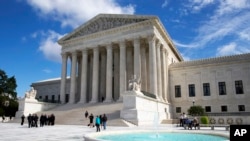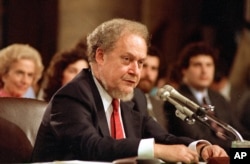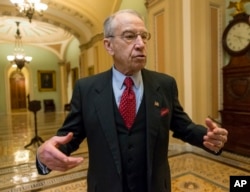A bruising partisan brawl over a U.S. Supreme Court vacancy could affect pending legal cases this year, but it is unlikely to tarnish the court’s image, no matter how the confirmation battle plays out, according to legal scholars.
The Senate will be ground zero for a ferocious election year fracas over whether President Barack Obama gets to choose a replacement for Justice Antonin Scalia, who died Saturday. The Senate has been in a weeklong adjournment that ends Monday, but virtually every member has staked out a position on whether Obama’s successor should fill the court vacancy, as Republican Majority Leader Mitch McConnell asserted.
Already, an extreme level of partisanship has been injected into the confirmation process for a position in an institution that seeks to operate above the political fray and sustain an air of decorum and reason.
“Although neither the court nor its reputation will be irreparably damaged, the political posturing exposes the reality that the court is just another branch of government, influenced by politics,” said New York Law School professor Ari Ezra Waldman.
“Vacancies on the Supreme Court have been contentious at many points in American history,” said Erwin Chemerinsky, dean of University of California-Irvine’s School of Law. “Because the court is evenly divided and the country is deeply polarized, it is not surprising that replacing Justice Scalia will be very contentious. But I do not believe that will hurt the court in any way.”
Bork nomination
Vacancies on the nine-member Supreme Court always generate intense national interest, but some far more than others.
In 1987, a political firestorm engulfed ultra-conservative jurist Robert Bork, who was nominated to the high court by then-President Ronald Reagan. Bork’s skepticism about an expansive right to privacy, from which numerous landmark Supreme Court decisions flow, sparked fierce opposition from women’s rights groups and other liberal advocates, as well as their mostly Democratic Senate allies.
Bork was rejected 9-5 by the Senate Judiciary Committee and 58-42 by the full Senate, with all but two Democrats opposing him and all but six Republicans voting to confirm.
Some legal observers argue the Bork nomination was the starting point of bare-knuckle partisanship in the judicial confirmation process and that Obama is reaping today what Democrats sowed in 1987. Others see no comparison between Bork’s full consideration by the Senate and the preemptive Republican rejection of Obama’s right to put forth a nominee.
“Republicans in the Senate have said that they are opposed to the president nominating anyone,” Waldman said. “The Democrats never denied President Reagan the opportunity to nominate someone; Mitch McConnell and the Republican majority are doing just that to President Obama.”
“I think it's too early to say whether it's comparable, because we don't yet have the [Obama] nominee,” said George Mason University law professor Ilya Somin. “We don't even yet know whether the GOP [Republicans] will simply refuse to consider the nominee.”
The chairman of the Senate Judiciary Committee, Republican Chuck Grassley, has backed McConnell in saying the court vacancy should be filled by the next president, but has not ruled out confirmation hearings for an Obama nominee.
Steep hurdle
Even if hearings are held and the nomination reaches the Senate floor, 14 Republicans would have to join with Democrats to advance to a final vote — a steep hurdle made even steeper by election year politics.
“This is not the first time a Supreme Court nomination might be hotly contested in the Senate. Such battles are understandable, given deep disagreements over judicial philosophy, especially at a time when the balance on the court is so closely divided,” Somin said.
And that balance has had a huge impact on the nation, according to Waldman.
“The politics of the court often mirrors the politics of the times,” he said. “[President] Franklin Roosevelt … ultimately appointed a majority [to the court]. That majority protected and cemented the constitutionality of the New Deal. Presidents [John] Kennedy and [Lyndon] Johnson appointed enough justices — [Byron] White, [Arthur] Goldberg, [Thurgood] Marshall, [Abe] Fortas — to create a solid progressive majority that protected the policies of the Great Society, including civil rights, one-person-one-vote, defendants' rights, free speech and economic regulation, just to name a few.
“And Presidents Reagan, George H.W. Bush, and George W. Bush appointed conservatives that tilted the court right on a host of issues,” Waldman added.






